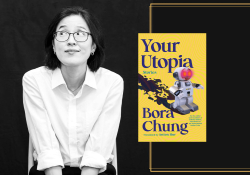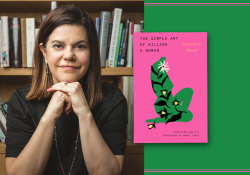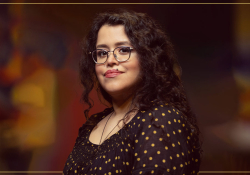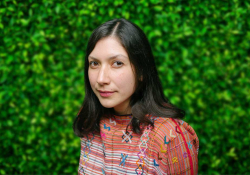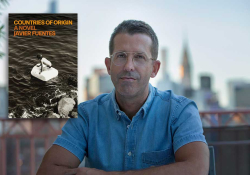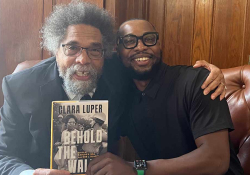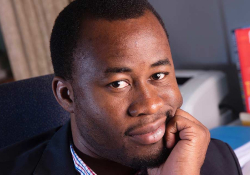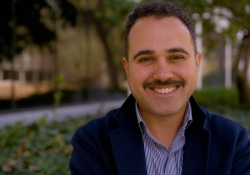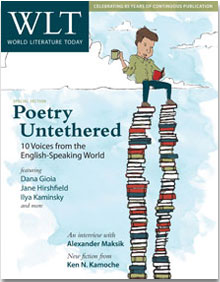The Romance and Reality of Paris: A Conversation with Alexander Maksik
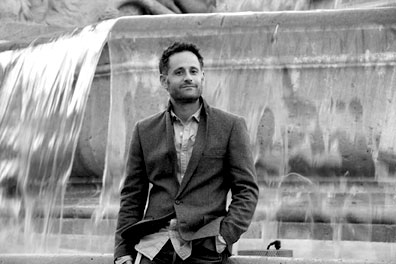
Alexander Maksik, who moved to Paris in 2002 to write and teach, is the author of You Deserve Nothing, the first book from Tonga Books, Europa Editions' new imprint, edited by Alice Sebold. His writing has appeared in several journals and the anthology Strangers in Paris: New Writing from the City of Light (Tightrope, 2011). The recipient of a Truman Capote Fellowship and a Teaching Writing Fellowship from the Iowa Writers' Workshop, he lives in Iowa City, where he's the provost's postgraduate writing fellow.
Here, WLT's managing editor interviews Maksik about the contemporary literary expatriate scene in Paris, the persistence of romantic notions of Parisian expat life, and Maksik's own work.
- - - - -
Michelle Johnson: Your novel, You Deserve Nothing, is set in Paris. Did you write it while living there? What is the relationship between your time in Paris and the novel?
Alexander Maksik: I did, and I'd never have written it without having lived in Paris. I'd lived there for three years before I began writing, so the love affair was over by then. Along with its charms, I'd also discovered a Paris that included all the awful things every other city includes—poverty and homelessness, neighborhoods divided by race and wealth, a variety of bigotry. So I set out to write a sort of anti-Parisian Paris novel. I knew that, for several reasons, I couldn't write about glittering lights and iconic avenues. In large part, the novel is about disappointment, and part of that disappointment is tied to the disparity between the romance and reality of Paris.
MJ: While you were living in Paris, did you think of yourself as an "expat"?
AM: Despite my best intentions, I did, yes. Or at least I thought of myself as foreign. When I first arrived in Paris, I was determined to become Parisian. It's an indication of my own immaturity and naïveté, I think—the idea I had then that I'd be able just to slip, practically unnoticed, into one of the most entrenched, closed, and suspicious societies in Europe.
MJ: In his essay "Translocal Underground: Anglophone Poetry and Globalization," Alistair Noon suggests we need a new word for anglophone poets living, writing, and publishing outside of their countries of origin and that we should begin by "ditching the term 'expat'" because it "defines its subject negatively: you're outside of your patria" and ignores that you're also "inside somewhere else." As a writer, do you see any negative, or at least limiting, connotations to the label expat?
AM: Well, I'm not sure how much the term matters. It's really a question of experience. The majority of my friends in Paris are from other countries—Lebanon, China, Italy, Morocco, the UK, the US, Norway—and I don't think I can remember any of them ever identifying themselves as expats. But there's no question that they, we, are formed by our experience of living outside our native countries. And frankly, being identified by nationality is considerably more limiting than being identified as an expat. Parisians like to know what you are, what your last name means. I'm consistently amazed by how determined Parisians are to identify and classify people in terms of nationality and ethnic heritage. I see this as a far greater problem than being identified as an expat.
MJ: In Never Any End to Paris, Enrique Vila-Matas's ironic account of his narrator's years in Paris in the 1970s, the narrator-author is trying to live as Hemingway did. (After telling his father he wanted to "study to be a Hemingway," his father sent him straight to law school.) And John McNulty's documentary, in which you appear, nods to Hemingway in its title, Welcome to the Feast. Do all literary Parisian expats trace back to Hemingway? Are current expats in Paris still responding to Hemingway's influence? Were you?
AM: I fell in love with Hemingway's Paris after reading A Moveable Feast. And I grew up in Ketchum, Idaho, where he lived, where he killed himself, and where he's buried. I also happen to think that he was an extraordinary writer. So, yes, I was seduced by the Paris of A Moveable Feast and The Sun Also Rises, but I was never taken with Hemingway merely because he boxed lions and wrestled marlins. I owe a debt to Hemingway because without him, I might have fallen in love with some other imaginary city, and gone off in search of that fantasy. It wasn't Hemingway's life in Paris that drew me to the city, it was his writing about Paris that drew me. A Moveable Feast is one of the most powerful pieces of writing I've ever read. It's an exquisite book. I've lived there. I've been drunk in the cafés he describes. I've written a novel there. I know the city well and, as I've said, been disappointed. But despite that disappointment, I can still read A Moveable Feast and feel what I always felt. I think that's an important distinction—it's the writing, not the city. Of course, there are plenty of writers living in Paris, who are there, in one way or another, because of Hemingway, but there are just as many who are there because of any number of other writers. Julio Cortázar's grave is always littered with notes and flowers.
MJ: I noticed the publisher's website, in describing the just-published anthology Strangers in Paris: New Writing Inspired by the City of Light, refers to "anglophone Parisian writing as it is today, without the veneer and expectations of stereotypes, romantic notions, or iconic representations." Is there a reality gap between our collective nostalgia for a bygone literary scene and the contemporary experience of moving to Paris and writing?
AM: Isn't there always a gap? Among other things, that's what living in Paris has given me—a hyperawareness of the distance between nostalgia and reality; the disillusionment and sadness of discovering that the cities we imagine don't exist. No, Paris now is not what Paris was. That said, nearly everyone I know there is an artist of some kind. And there's nowhere else in the world that provides for me the same sense of community. I don't know how much that has to do with Paris itself, but certainly the fact that we all come from somewhere else serves to strengthen that community. What's remarkable about the anglophone artistic "scene" in Paris is how supportive people are of one another and how uninterested they seem in the business of their art.
MJ: Could you tell me a little about your piece in the anthology?
AM: It's a short narrative about walking in the Montparnasse cemetery with my father. I've spent a lot of time there. It's not nearly as glorious as Père Lachaise, nor is it so glutted with tourists. I find it one of the most peaceful places in Paris. The day I write about, my father and I were wandering around before going to meet my girlfriend's family for the first time when a bird shat on my shirt. That would never have happened in Père Lachaise.
MJ: What does it mean in 2011 to be an expat in Paris, and what does the literary expat scene look like?
AM: I don't think there's any one literary expat scene in Paris. David Barnes's "Spoken Word" is about as democratic a community as exists in the city, and it draws a vast variety of writers, musicians, actors. I love the spirit of those nights, and I think David's done an extraordinary job of keeping it vibrant and utterly unpretentious. The spectrum of talent and seriousness is broad and varied. "Spoken Word" has been in five or six different venues, but for the last few years it's been at Cabaret Populaire in Belleville, which is one of my favorite bars in the city. I love being there precisely because it's far from Hemingway's Paris, and the audience isn't sharpening its claws. I met David and began reading at "Spoken Word" about the same time I started writing my novel. That community sustained me through some of the most difficult years of my life, and I'll be grateful forever for that.
"Poets Live" is another good reading series, which has just been taken over by Rufo Quintavalle, who is a friend and an excellent poet. Jennifer Dick does another great series called "Ivy Writers." There's also "Double-Change," which promotes both French and anglophone writers.
MJ: Paris is known for its café culture. In fact, the American Library in Paris recently displayed a photography exhibit of Anne Boudard's work, Les cafés parisiens: Paris coffee style. What role did cafés play in your writing life while in Paris, and is there an Iowa City analogue?
AM: When I first moved to Paris, I wrote nearly every evening after work at La Palette, a café down the street from my apartment. I was friendly with a few of the waiters, and, in those early days, I took great pride in being known there and would look forward to settling in and getting to work. Sadly, the café was sold, and though it looks the same, it's become slicker somehow, more of a place to be seen, and those waiters have been replaced.
Something I love about the city is that you're permitted to be alone. There's nothing unusual about being alone in a café. It's a common observation, but nonetheless true, that in most cafés, for the price of a beer or a glass of wine, you can stay and work for hours. I like to work in public—all those people around me keep me focused somehow, keep me from procrastinating. I've learned that an important aspect of writing is inventing structure that doesn't actually exist. In Iowa City, I love to write upstairs in the café at Prairie Lights. It's as close to a Parisian café as I've found here. And by the way, the store's wireless code is "Gertrude Stein."
MJ: Iowa City, like WLT's home (Norman, Oklahoma), is a landlocked Midwestern city. Yet Iowa City is a unesco City of Literature, and Norman has been host to hundreds of international writers, particularly during the festival surrounding the Neustadt International Prize for Literature and NSK Neustadt Prize for Children's Literature. Surely these defy the stereotype of literary culture existing only in big, cosmopolitan cities?
AM: The level of support and enthusiasm that the Iowa City community provides writers is extraordinary. I've never lived anywhere where writing is treated with near universal reverence. Living here can be dangerous in the sense that it's easy to be lulled into believing that the rest of the world cares as much about books. It's funny; Paris and Iowa City are the two cities I've lived where I've never hesitated to introduce myself as a writer. In both places, writers are granted immediate respect, and that's not always the case elsewhere. Yes, there's an apparently endless train of literary luminaries who come through to do readings, but what's reassuring is that there are so many people living here who are passionate about writing, and care about it more than nearly anything else. There's no question that Iowa City, in terms of literary culture, can compete with any major city in the country.
MJ: In You Deserve Nothing, at the International School of France, a classroom's walls include photos of Sarte, Camus, and Hemingway with Sylvia Beach standing in front of the Shakespeare & Company bookstore. Is Shakespeare & Company still at the heart of literary Paris?
AM: Well, they certainly play a major role in Paris's anglophone literary world. They're very supportive of young writers and continue to allow a few to live upstairs in return for some pretty nominal work. Their summer festival is fantastic and exceptionally well run. They're about to award their first Paris Literary Prize, which is a considerable award and reserved for new writers. What's particularly impressive, I think, is that while they host all sorts of established writers, they also allow those who are lesser known to read. I admire, and am grateful to, any bookshop that's vibrant and alive and seems to have a clear vision for the future. Given their location, and given their history, I think it would have been easy to allow the shop to become a kind of literary Disneyland, but Sylvia Whitman seems determined not to allow that to happen.
MJ: Do you have a favorite bookstore?
AM: I have several. In Paris, the Village Voice is my favorite. I also love L'écume des Pages and La Hune. In San Francisco, City Lights. In Seattle, Elliot Bay. I have a tremendous affection for Prairie Lights, which is a genuinely wonderful bookstore. Also for Iconoclast Books, in Ketchum, Idaho, where I've been buying books since I was a teenager.
MJ: Is it fair to say your novel alludes to some of the familiar symbols of Parisian expat writing even as it challenges our romantic expat-in-Paris notions? Or perhaps I'm trying too hard to push your novel—about the distance between desire to act and the courage to do so—into a box that fits the subject of our interview?
AM: No, I think that's a fair observation. But the problem is that it's nearly impossible to write about Paris without making some reference to those symbols. Paris itself is a symbol. The word is so freighted, that the minute you type the letters, you're triggering all kinds of literary and emotional associations. Judging by the number of books published each year that have something to do with Paris, it appears that there's no end to the appeal. I was certain that the only way to handle writing a book set in the city was to deal with the gap between what is expected and what is found. Paris can no more live up to expectations than can one's teacher, or one's father.
MJ: Gilad, a student, is disappointed when, on his first day of school, he realized Paris "was irrelevant to the school." He feels his potential to be "swallowed up by a place" is threatened by the symbols of America he encounters while riding the bus to school and concludes: "ISF was its own country." Is this international school a microcosm of globalization's homogenization of culture, another example of an "American badge" on Paris, or something else?
AM: All schools are insular. I don't think you find any more evidence of globalization inside those walls than you do outside them. Gilad complains about ISF early on in the novel, but I don't imagine he'd complain about it now. I'd like to think he's outgrown that adolescent tendency to rail against whatever institution happens to contain him. When I moved to Paris there wasn't a single Starbucks in the city. There are now thirty-nine. After the United States, France is McDonald's most profitable market. This is a real source of anxiety for the French, as well it should be. Independent cafés are closing and being bought up by groups like FLO; all the young smokers smoke Marlboro Lights. It goes on and on. America is everywhere in France, and had Gilad been paying attention, he'd have seen it in the street far more often than in the halls of ISF.
MJ: Vila-Matas's narrator sought liberation: "We all encounter a small world at birth, a world that is generally the same wherever we are born." He became interested in "the noble idea of forgetting the stifling atmosphere of Barcelona and being able to enjoy, in self-imposed exile, the free French air." Do you agree that Paris offers liberation? Did you go to Paris seeking liberation? If so, did you find it?
AM: I think any great city can offer liberation. I'm not sure that I went in search of liberation, though I certainly went with wildly romantic notions about what Paris would do for me. I think I stopped being young in Paris. It's a strange thing to say, I guess, but something shifted in those first years. I had promised myself that I would live in Paris before I was thirty, and I moved there when I was twenty-nine. I'd lived in Los Angeles for a long time before moving to Paris and knew a lot of actors who were also pursuing an illusion. I was like one of those women looking out the window, seeing the Hollywood sign for the first time. I mean, you can't imagine how happy I was to be in France, how certain I was that the city would change everything. There's not a city in the world that could have lived up to what I expected of Paris. That said, I suppose I did find some kind of liberation—it was the liberation of anonymity. I love to be alone, and I've never felt so comfortable being alone anywhere the way I do in Paris. People say that New York gives you the same freedom, but whenever I'm in New York I can never find a place to disappear the way I can in Paris.
MJ: So do Parisians seek this same liberation by leaving Paris and going elsewhere?
AM: I knew some Parisians who traveled fairly often, and some who moved to California and swore they'd never return to France. But generally speaking, I don't think Parisians have that same desire to go off and become something else. Some Americans feel embarrassed by their nationality. They have notions, as I did, that by living in European cities we will become somehow "less American," which is to say more sophisticated, more elegant, more cultured. I've never met anyone embarrassed to be French. The French vacation primarily in France and in former colonies, where they can speak French and eat familiar food. I don't think it's quite the same mentality. I know very few French who have dreams of giving up their lives and starting again in an unfamiliar country. It's that old country / new country paradigm.
MJ: What are you working on now?
AM: I'm writing a novel about a Liberian immigrant living illegally in the Cyclades, which probably seems like a departure, but during my years in Paris, I became increasingly interested in the experiences of African immigrants living in Europe. Immigration, and particularly illegal immigration from the Maghreb and western Africa, is a major concern for a lot of western Europeans and, if it isn't already, will soon become the central political issue across the continent, I think. In the last few years, there's been a surge of far-right politics, and it's frightening to see how people like Geert Wilders and Marine Le Pen are gaining momentum, not to mention legitimacy, on anti-immigration platforms. You see similar movements of varying extremism in Sweden, Denmark, Finland, Belgium, and the UK as well.
I've been surprised by how many times at Iowa I've heard some variation of the argument that we "shouldn't" write from the perspective of people we don't know, that we don't have the "right." Men don't have the right to write from the perspective of women, etc. The notion that someone might not have that right strikes me as absurd. Either a work of fiction is successful or it is not. I have no interest in writing over and over about myself.
MJ: What do you miss when you are not in Paris?
AM: I miss many things—the physical landscape of the city, the sheer beauty of the place, the light, the sky. I miss the people—their elegance and nonchalance, the variety of faces. I miss my quotidian life—particular cafés, bars, and restaurants. And as much as anything, I miss that feeling of anonymity. I miss walking and riding my bike everywhere, and I miss those fleeting moments that always seem to come when I've sworn I'm going to leave forever, when I come around a corner, and the city just opens up and I think, "This is everything." You see? Despite it all, the romance remains.
June 2011
Editorial note: For a review of Never Any End to Paris, see page 67 in the print edition of this issue.
